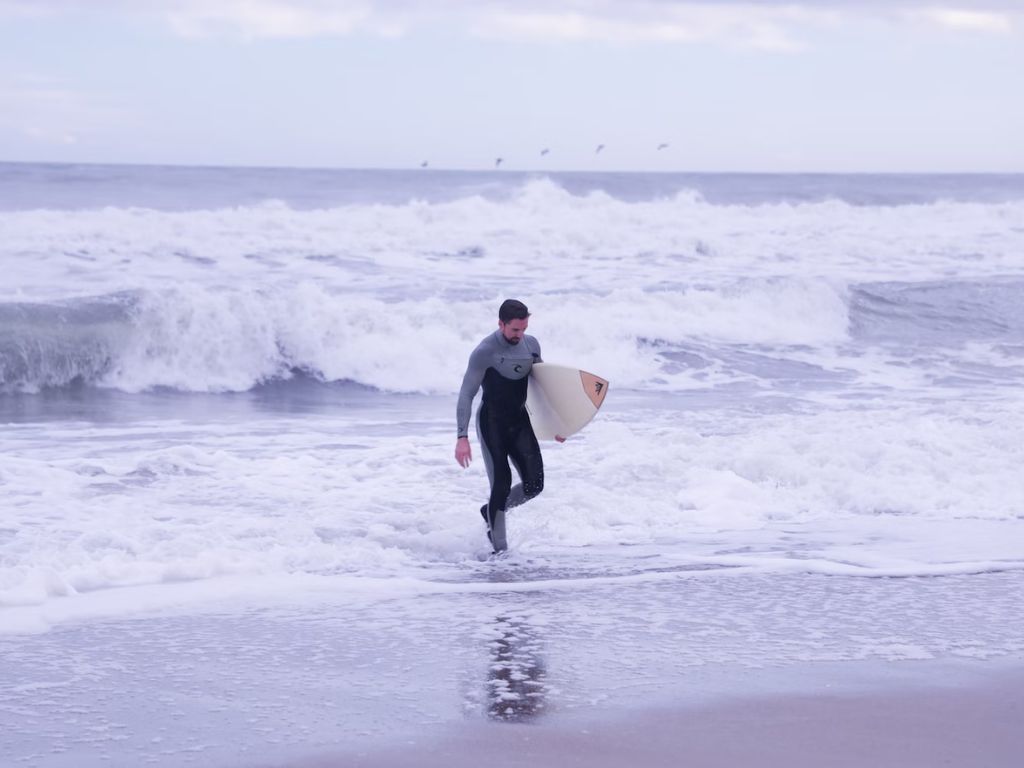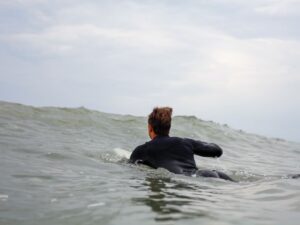The possibility that one day you might snort out a splash of seawater at an inappropriate place is especially daunting.
But don’t worry, you see, a runny nose after surfing or “post-nasal drip” is fairly common among riders. And it isn’t a career-ending scary experience as you might think.
Generally, you get a runny nose after surfing if the seawater is stuck in the sinuses. The seawater then comes out of the sinuses when dislodged through certain head movements, causing post-nasal drip. Also, cold water can irritate the sinuses, leading to inflammation and excess mucus production.
Obviously, you could’ve found this information on dozens of websites with one search. But unfortunately, there isn’t much discussion about dealing with a runny nose in the online surfing community.
Let’s fix that. I’ll explain the problem first, and then we’ll get to the solution.
1. How does seawater get trapped in the sinuses?
The simplest explanation is that your sinuses get flushed with salt water during surfing, some of which remain inside.
Your sinuses are air-filled spaces in the skull connected to the nasal passages. Water can flow into these passages and enter the sinuses during surfing.
Now, onto the embarrassing part. Why does the water discharge all at once, like a flood?
Surfers may get a runny nose several hours after surfing as the seawater gets discharged from the nose all at once in a flood-like manner. It happens because the body’s natural defense mechanism kicks in to flush out the water trapped in the sinuses.
Here’s the kicker: the flood only happens if your nasal cavities are broad. If you have smaller nasal cavities naturally or due to inflammation and other sinus issues, there will be no flood. The seawater will still come out but much more slowly and constantly.
Unfortunately, not everything about this is standard. If the discharge continues for an extended period, it may indicate an underlying problem, such as sinusitis. And sinusitis doesn’t bode well for surfers.
2. How do you drain your sinuses after surfing?
Do a nasal rinse with hypertonic solution (saline solution) using a Neti pot a few times a week to drain your sinuses after surfing. It’ll eliminate your runny nose because a nasal rinse can help reduce inflammation while flushing out any infection or debris lodged in your sinuses.
Tip: Boil the water first if you’re making the saline solution home.
Otherwise, here are the 9 most-practiced solutions for a runny nose among surfers:
1. Blow your nose gently post-surfing.
It clears out mucus and trapped seawater. Blowing too hard can worsen things by causing irritation and inflammation.
2. Use a saline spray.
It helps moisturize and soothe your nasal passages, which can help reduce inflammation and relieve congestion. You can find saline sprays at most drugstores or make your own by mixing salt and water.
3. Use a Neti pot.
A neti pot is a small pot that flushes out your sinuses with saline solution. This can help remove mucus and seawater trapped in your sinuses. Use sterile water and follow the instructions carefully to avoid infection.
4. Stay hydrated.
Drinking plenty of fluids can help thin out mucus and make it easier to clear your sinuses. Aim to drink at least 8-10 glasses of water a day.
5. Use a humidifier.
Keep the air moist to prevent your nasal passages from drying and irritation.
6. Rest and relax.
Let your body recover from the physical exertion of surfing and reduce stress, which can also exacerbate symptoms.
7. Breathing in steam.
It can help moisturize your nasal passages and loosen mucus, making it easier to clear your sinuses. You can do this by taking a hot shower or boiling water in a pot and breathing in the steam.
8. Drink ginger tea.
Ginger has natural anti-inflammatory properties that can help reduce inflammation and relieve congestion.
9. Use Eucalyptus oil
Eucalyptus oil has a natural decongestant effect and can help relieve nasal congestion. You can add a few drops of eucalyptus oil to a bowl of hot water and breathe in the steam, or apply a small amount of the oil to your chest or throat.
3. Why do I have sinus problems at the beach?
It’s very common to experience sinus problems at the beach.
Generally speaking, you may experience irritation or sinus problems at the beach due to salty sea air and wind. Potential allergens in the sand and public areas such as restrooms can also stimulate your sinuses. Additionally, changes in humidity and temperature at the beach can dry out your sinuses, causing them to produce excess mucus.
If you’re prone to sinus issues or allergies, it’s best to take preventive measures like using saline nasal sprays and wearing a hat or sunglasses to block out irritants.
4. Can you get sinusitis from surfing?
Research suggests you can get sinusitis or develop an infection due to surfing. A study published in the Journal of Laryngology and Otology investigated the prevalence of sinusitis among surfers in the UK. 19.4% of the surveyed surfers reported symptoms consistent with sinusitis.
Sinusitis is when the sinuses become inflamed, leading to congestion, headaches, and a runny nose. For your knowledge, let’s do some anatomy.
There are four sinuses: the maxillary sinuses, the frontal sinuses, the ethmoid sinuses, and the sphenoid sinuses. Each set has a specific function, but collectively, they all help to humidify and filter the air we breathe.
Surfing can cause sinusitis when the seawater is trapped inside your sinuses. It can become a breeding ground for bacteria and viruses, leading to an infection. This infection can cause the sinuses to become inflamed, leading to symptoms like congestion, headaches, and a runny nose.
Surfing can cause sinusitis in three major ways:
1. When you paddle out to catch a wave, you may get hit in the face with a wave, which can force water up your nasal passages and into your sinuses.
2. Cold water in the ocean can also lead to sinusitis. When the nasal passages are exposed to cold water, the blood vessels constrict, reducing blood flow and limiting the body’s ability to fight infections. This can make it easier for bacteria and viruses to cause sinusitis.
3. The repetitive motion of paddling and duck diving can also contribute to sinusitis. The constant pressure changes as you surf up and down in the water can cause the sinuses to expand and contract rapidly. Over time, this can lead to inflammation and swelling.
5. How to prevent sinus infections after surfing?
The best way to avoid a runny nose hours after surfing is to remove excess water as soon as you’re out. Tilt your head to 2’o 2-clock and 11-clock positions to let the water drip out. Although, you might have to wait for the seawater to flow naturally if you have narrow nasal cavities.
As the old saying goes, “prevention is better than cure.” This holds true for surfers who want to avoid sinusitis. There are several measures that surfers can take to prevent the condition and enjoy surfing without any sinus issues.
I. Warm-up exercises before surfing.
Warming up before hitting the waves helps increase blood flow, loosen muscles, and prevent injuries. Moreover, it can prevent sinusitis by increasing blood flow to the nasal passages and sinuses.
Breathing exercises can help improve your lung capacity and increase blood flow to your nasal passages and sinuses. To perform breathing exercises, sit comfortably, take slow, deep breaths through your nose, and exhale through your mouth.
II. Use nose clips while surfing.
A nose clip is a simple yet effective way to prevent water from entering the nasal passages and sinuses. Nose clips come in different shapes and sizes, so you can choose one that fits comfortably and securely.
Here are some tips for using a nose clip:
- Choose the right size that fits comfortably and securely.
- Adjust the clip properly so that it sits comfortably on the bridge of your nose and seals off both nostrils.
- Use the clip consistently to ensure maximum protection against water entering your nasal passages.
III. Use saline sprays and rinses.
Saline sprays and rinses keep the nasal passages and sinuses clean and moisturized. Saline solutions help flush out debris, allergens, or irritants that may cause sinusitis. The idea is to clean any excess water as soon as you’re done surfing. And also to disinfect the area.
Here are some tips for using saline sprays and rinses:
- Choose the right product that’s appropriate for your needs.
- Follow the instructions carefully to ensure maximum effectiveness.
- Use the product consistently to achieve the best results, preferably before and after surfing.
IV. Always surf in clean waters.
Avoid surfing in polluted waters, especially after rainstorms. It’s ideal for keeping your “playground” as germ-free as possible.
6. How to treat sinus problems in surfers?
Generally, it can take up to 10-14 days to fix sinusitis or other sinus-related problems among surfers if it’s acute. For chronic sinusitis, treatment and recovery usually last for 12 weeks or more.
There are several treatment options for sinusitis, and the best one for you depends on the severity of your symptoms and the underlying cause of your sinusitis. Some common treatment options include medications, nasal irrigation, and surgery.
1. Sinusitis Medications
If your symptoms are mild to moderate, your doctor may recommend medications to treat your sinusitis. These medications can include decongestants, antihistamines, and nasal corticosteroids.
- Decongestants narrow the blood vessels in your nose’s lining, reducing swelling and congestion.
- Antihistamines block the action of histamine, a chemical that causes allergic reactions.
- Nasal corticosteroids reduce inflammation in your nasal passages, which can relieve your symptoms.
2. Surgical Options
If your sinusitis is chronic and doesn’t respond to other treatments, your doctor may recommend surgery.
The most common surgical procedure for sinusitis is called endoscopic sinus surgery. It involves inserting a thin, flexible tube with a camera into your nose, allowing your doctor to see inside your sinuses. Your doctor can then remove any blockages or polyps causing your symptoms.
Sometimes, your doctor may recommend balloon sinuplasty, where you insert and inflate a small balloon into the sinuses. It widens your sinus passages and improves drainage.
In rare cases, your doctor may recommend traditional sinus surgery. It involves making an incision in your face to access your sinuses, allowing your doctor to remove any blockages or polyps.
If you experience a runny nose or facial pressure symptoms, remember that I’m NOT your doctor. You can return to this article for tips but don’t use it as a replacement for your GP’s advice.
Your doctor can recommend the best treatment options for you and help you return to enjoying the waves in no time.
Expert QnA
Q. Can surfing cause post-nasal drip?
Surfing can cause post-nasal drip. When seawater enters the nasal passages during surfing, it can irritate the nasal membranes, causing them to produce excess mucus. This excess mucus can then drip down the back of the throat, leading to post-nasal drip.
Q. Can sinusitis be prevented in all surfers?
While preventive measures can reduce the risk of sinusitis, some surfers may still develop the condition due to anatomical variations, allergies, or infections.
Q. Can using nose clips while surfing cause discomfort or affect breathing?
Some surfers may find nose clips uncomfortable or may experience breathing difficulties while using them. It’s important to try different types of clips and adjust them properly to find a comfortable fit.
Q. Can over-the-counter medications alone cure sinusitis?
Over-the-counter medications such as decongestants and pain relievers can help relieve the symptoms of sinusitis, but they may not cure the underlying infection or inflammation. In some cases, prescription medications or surgery may be necessary.
Q. Can surfers still surf while recovering from sinusitis?
It’s generally recommended to avoid surfing and other activities that may worsen the symptoms of sinusitis until the condition has resolved or has been adequately managed. Consult with a healthcare professional for specific recommendations based on your situation.





